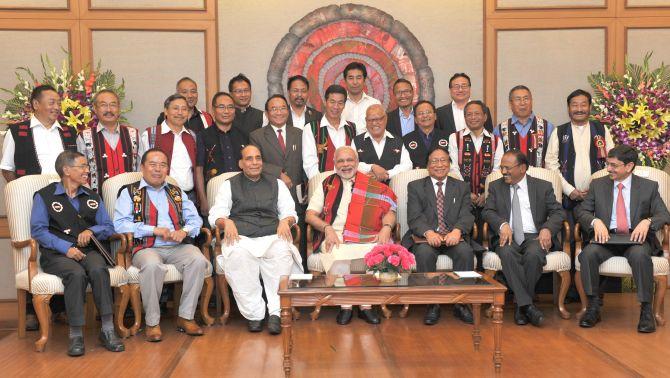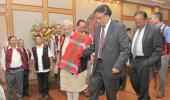'NSCN-IM leader Muivah warns that the NSCN-IM has come very close to an honourable solution to the peace process with the Government of India, but if it does not materialise, then the Nagas will go away so far that it would be difficult to bring them back to the negotiating table easily,' note Sandeep Pandey and Meera Sanghamitra.

The Nagas claim that their leader Phizo never signed any instrument of accession with India like the other 562 princely states and Nagaland or Nagalim, as they prefer to call their land, was never part of India either with consent or by conquest.
Nagas are proud of their unique history in which they have never been subject to foreign rule.
It was the British which first made Nagaland part of Assam after a number of violent clashes in which there were casualities on both sides.
Nagaland has also witnessed inter-tribal violence. There are close to 40 different tribes with distinct cultural identities.
The Nagas had asked the British to let them have the freedom to determine their future. The British had also agreed to a concept of limited sovereignity based on traditional idea of self-rule.
Mahatma Gandhi had supported the right of Nagas to determine their destiny.
When India was about to achieve Independence Nehru offered local autonomy to the Nagas, but they continued to assert their identity as a separate nation.
It remained part of Assam after Independence.
After a violent uprising the army was sent in 1955. Three years later, the Armed Forces Special Powers Act was promulgated to contain the Naga rebellion.
In 1963 Nagaland became a separate state after an agreement of the Naga People's Convention with the Nehru government, which was described by Phizo as a sellout.
In 1975 there was a Shillong agreement with the Naga National Council. This was rejected by some.
Isak Chisi Swu, Thuingaleng Muivah and S S Khaplang formed the National Socialist Council of Nagalim to carry on the struggle for sovereignty.
In 1988, there was a split in the NSCN. NSCN-Isak Muivah leaders Swu and Muivah went to Europe. NSCN-Khaplang leader Khaplang settled in Myanmar.
Prime Ministers P V Narasimha Rao, H D Deve Gowda and Atal Bihari Vajpayee met Swu and Muivah in Paris, Bangkok and Amsterdam respectively.
A process of dialogue has been going on after a ceasefire agreement in 1997.
A framework agreement was signed on August 3, 2015 with the Narendra Damodardas Modi government.
Interlocuter R N Ravi, now the governor of Nagaland, signed on behalf of the Government of India and Muivah signed on behalf of the Nagas in Modi's presence. Swu signed from a hospital bed.
A concept of shared sovereignty and inclusive relationship of enduring peaceful co-existence of the two entities has been agreed to.
The NSCN-IM has worked out in detail the delicate balance of competencies which will define the nature of the relationship.
It wants the Nagaland government to cover all Nagas, even those living in Manipur, Arunachal Pradesh and Assam and ultimately hopes for integration of all land inhabited by the Nagas, their long standing demand.
There will be Naga regional councils in these three states, according to the NSCN-IM. Naga regional territorial councils wil have its own legislature, executive and judiciary. The judiciary will comprise both customary and modern law.
Land and resources above and below will belong to Nagaland. Naga areas are rich in petroleum, natural gas, coal and other minerals. Presently, the central government just shares less than a fourth of the revenue with states.
The NSCN-IM wants international relations to be with India except for matters related to Nagaland.
Nagaland will have separate foreign offices for culture and education, states the NSCN-IM.
Nagaland will have its own education system. It will also expect reservation for students from Nagaland in Indian educational institutions.
Even with a Christian majority Nagaland would remain a secular state.
Security will be with the local government, the NSCN-IM states, but defence will be shared with the Indian Army.
The NSCN-IM aspires to have a separate anthem, insignia, flag and constitution. Two members will represent Nagaland in the Rajya Sabha.
The agreement reached will not be altered unilaterally and will require a two thirds majority in Parliament as well as the Nagaland assembly, states the NSCN-IM.
The Armed Forces Special Powers Act will be revoked and not be imposed by India.
In August 2019, immediately after abrogation of the special status of Jammu and Kashmir under Article 370 of the Constitution, Nagaland Governor R N Ravi revealed that Modi wanted a final agreement to be signed with the Nagas within three months.
Modi wants Nagaland to integrate with India like any other state.
When it was expected that a final accord would be signed soon, the government is trying to bring on board a group of six organisations called Naga National Political Groups which has raised a question on the proposed constitution of Nagaland.
The NSCN-IM leadership considers this as betrayal. Muivah says in a democracy sovereignty lies with the people, hence the sovereignty of the Nagas lies with the Nagas.
Muivah warns that the NSCN-IM has come very close to an honourable solution to the peace process with the Government of India, but if it does not materialise, then the Nagas will go away so far that it would be difficult to bring them back to the negotiating table easily.
The government must live up to its commitment to the NSCN-IM with whom it has been in dialogue for 22 years.
Nagaland is not asking for independence. All the NSCN-IM wants is an arrangement of shared sovereignty and peaceful co-existence with India.
Muivah asks how the Nagas can surrender without any achievement in the peace process. They did not have a dialogue for 22 years to merely become one of India's states.
As Loknayak Jayaprakash Narayan said it is better to have friendly Nagas on our frontier rather than unfriendly and discontented, kept forcibly within India.
Sandeep Pandey is associated with the Socialist Party (India) and Meera Sanghamitra with the National Alliance of People's Movements.










